Our Racial Equity Journey
Jump to What Are We Building?—our vision for racial equity in community arts education and our Racial Equity Committee's charge
Jump to Who Is Building It?—the people who have built the foundation for racial equity work at the Guild
Jump to How Are We Building It?—timeline of the work so far, the Guild's external racial equity assessment, and our Racial Equity Guiding Principles and Policies
What Are We Building?
We as community arts educators have a responsibility to prioritize addressing racial injustice as a crucial part of our work. Structural and institutional racism and violence directly impact the people who make up our communities and our organizations. The work to address this includes acknowledging the roots of racial inequity (including within our own organization and practice) and dismantling these inequities by developing and implementing equitable structures, policies, and practices that are rooted in social justice values. Our Racial Equity Guiding Principles and Policies outline the steps we will take moving forward.
We acknowledge that the work of anti-racism is relatively new and emergent for our organization. As we move through this journey, we are committed to continually unlearning, disrupting, and rebuilding as part of our antiracist practice. We are also committed to using a human-centered framework—this work built with people, through relationship, over time.
Racial Equity Committee's Definition of Equity
Racial equity refers to what a genuinely non-racist society would look like; a society where an individual’s racial identity does not inform the distribution of resources and benefits, marginalization or discrimination, and all people experience psychological and physical safety. Racial equity holds society to a higher standard, it demands that we pay attention not just to individual-level discriminination, but to overall institutional, structural and systemic racism.
Racial Equity Committee Charge
The responsibility of the Racial Equity Committee is to:
(i) provide guidance and expertise to the entire organization and its members in order to actualize the Guild’s core value of equity through the development of racial equity goals, metrics, and accountability and implementation plans.
(ii) investigate, understand, and acknowledge the roots and realities of racial equity and inequity within American society in general and within the National Guild organization and the community arts education field specifically.
Based on this understanding, the committee will chart a course to dismantle racially inequitable practices within the organization, within its membership, and within the community arts education field by recommending and implementing alternative racially equitable structures, systems, policies and practices.
Who Is Building It?
Our board's Racial Equity Committee, which is made up of trustees and staff liaisons, is working alongside staff in reimagining a national vision for community arts education that is bold and deeply rooted in our values and accountability to the field.
We are also building upon the immense contributions of many people, including current and former BIPOC (Black, indigenous, and other people of color) staff, board members, and program partners, as well as white allies in the organization.
In our timeline of work below, we recognize many of the individuals who have made significant contributions to creating a foundation for racial equity as ALAANA leaders, Racial Equity Committee members, CAELI faculty, and staff. You can read a list of all members of the Racial Equity Committee (past and present) here.
We want to extend a special thanks to the following people for their extensive work and far-reaching impact: Nicole Amri, Sandra Bowie, Rodney Camarce, Jeannette Tremblay Chambers, Ama Codjoe, Lara Davis, Quanice G. Floyd, Derrick Gay, Ashley Hare, James C. Horton, Karen LaShelle, Lissette Martinez, Indi McCasey, Robyne Walker Murphy, Dan Reilly, Fern Renville, Kwame Scruggs, Renee Smith, DeLashea Strawder, Marie Tai, and Leslie Thomas.
How Are We Building It?
The graphic below outlines the Guild's racial equity work to date. This timeline is not exhaustive, but includes some key points in the process. You can find more information about some of the points in the timeline below, including a link to our external racial equity assessment and graphics illustrating our Racial Equity Guiding Principles and Policies.
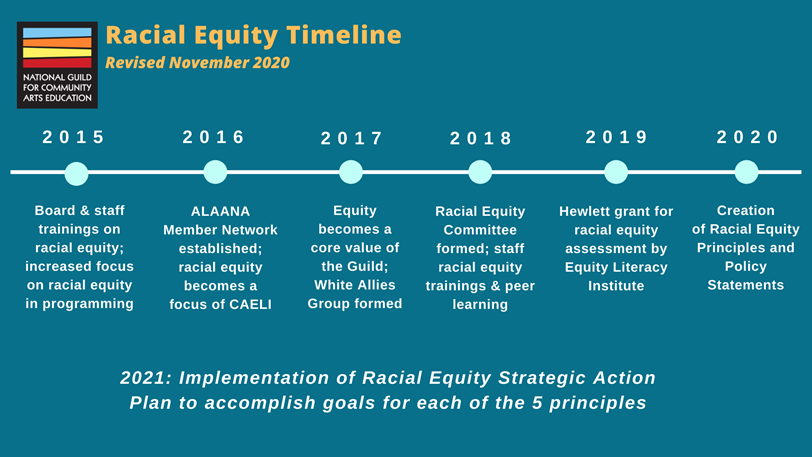
2015: Board & staff trainings on racial equity; increased focus on racial equity in programming
2016: ALAANA Member Network established
In 2016 Robyne Walker Murphy started the ALAANA (African, Latinx, Asian, Arab, Native American) Member Network with the support of James C. Horton, and with Lara Davis and Rodney Camarce as its first co-Ambassadors. This group of leaders, along with the Network's founding steering committee which included Leslie Thomas, Nicole Amri, DeLashea Strawder, Marie Tai, Kwame Scruggs, Renee Smith, and Fern Renville, did an immense amount of labor to build a space that centered the needs and opportunities of artists and administrators of color within Guild membership and the broader community arts education field, as well as to hold the Guild and its membership accountable in the fight for racial justice.
2016: Racial equity becomes a focus of CAELI
Starting in 2016, first as faculty member and then as Co-Director of CAELI (our leadership development institute), Ama Codjoe worked to make racial equity the framework for the program and for our alumni network. Her collaboration with the Guild on CAELI and other programs played a foundational role in strengthening and clarifying the Guild's commitment to racial equity as an organization.
2017: Equity becomes a core value of the organization; White Allies Group formed
Equity was officially added to the Guild's organizational core values in 2017, due in large part to the leadership of Sandra Bowie (Trustee). A White Allies Group was also established as a Member Network.
2018: Racial Equity Committee formed; staff racial equity trainings and peer learning
The Racial Equity Committee formed as a standing committee of the board in 2018. See a complete list of Committee members and staff liaisons past and present here. Staff racial equity trainings and peer learning continued.
2019: Hewlett grant for racial equity assessment by Equity Literacy Institute
In 2019, the Equity Literacy Institute (ELI) conducted an external racial equity assessment of the Guild, with support from the Hewlett Foundation. Based on this assessment, recommendations were made to move the organization toward anti-racist policies and practices. You can read about ELI’s findings and recommendations below:
National Guild racial equity assessment report
2020: Creation of Racial Equity Principles and Policy Statements
Drawing from the assessment and recommendations, the Racial Equity Committee and Guild staff developed a set of Racial Equity Guiding Principles and Policy Statements in 2020. This was a collaborative process involving lots of work from many people, with Sandra Bowie, Karen LaShelle, and Derrick Gay (Co-Chairs of the Racial Equity Committee) and Ashley Hare (Director of Leadership Development) playing a particularly large role in driving this work forward. These principles and policies were then officially approved by the board as an addendum to the governing by-laws of the organization. The graphics below illustrate the Racial Equity Guiding Principles and Policy Statements.

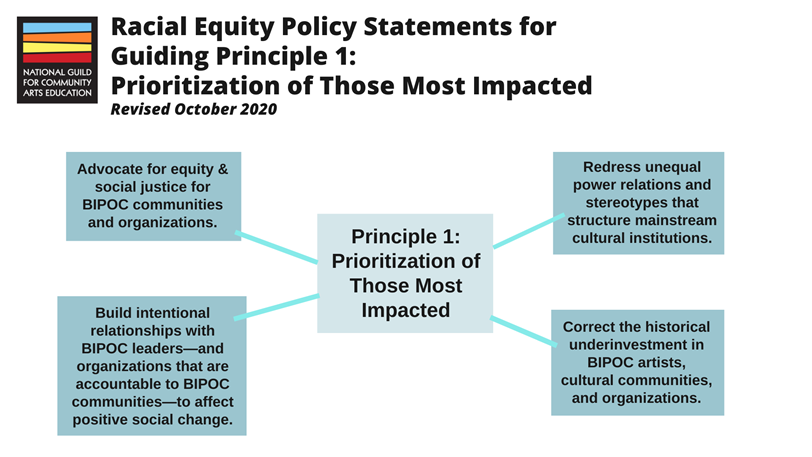
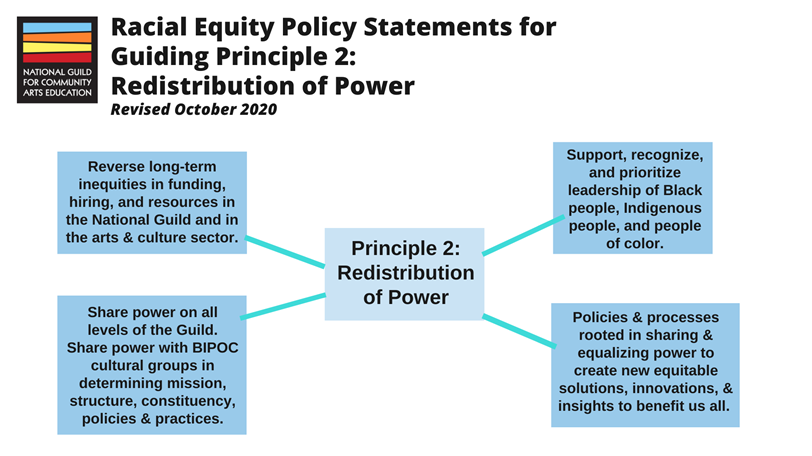
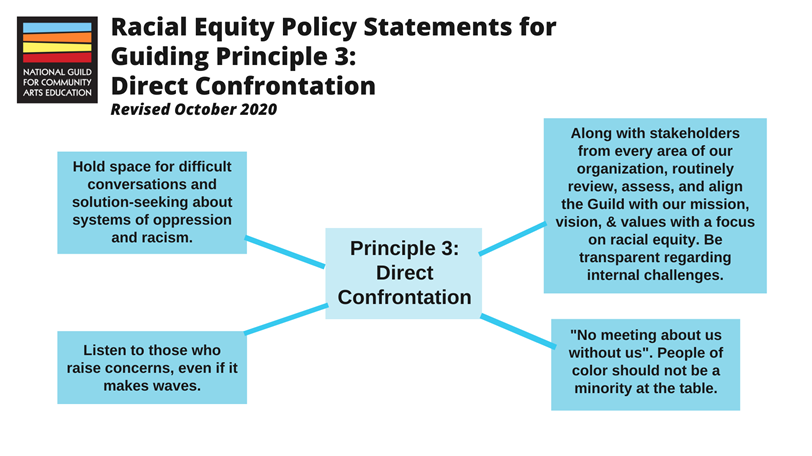
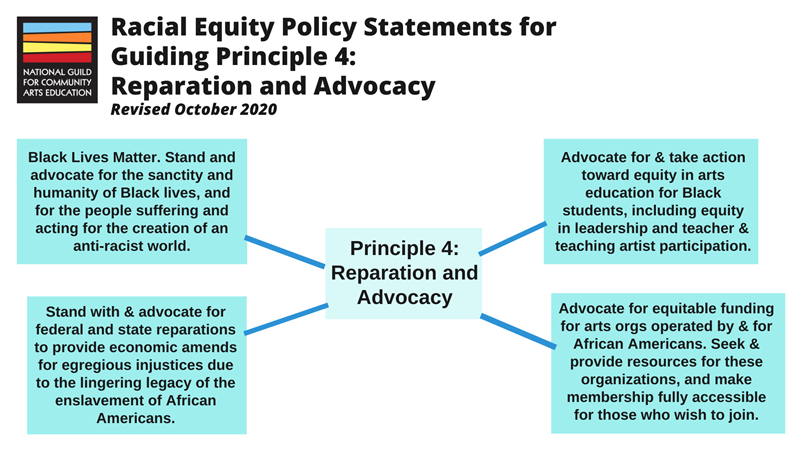
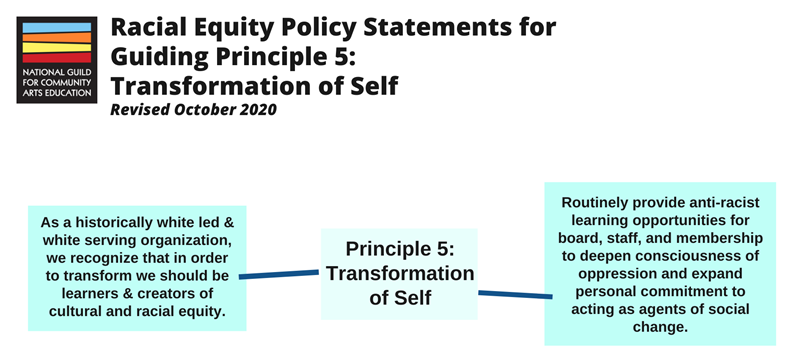
Read our full Racial Equity Guiding Principles and Policies document
2021: Implementation of Racial Equity Strategic Action Plan to accomplish goals for each of the 5 principles
In 2021, we began to implement a Racial Equity Strategic Action Plan to accomplish our goals in relation to each of the 5 Racial Equity Guiding Principles, as well as a business plan to support this work. We will continue to share our progress, for the purposes of accountability, transparency, and co-learning.
Racial Equity Committee Members, Current and Former
Trustees
Sandra Bowie (chair)
Karen LaShelle (chair)
Gayle Morgan
Duffie Adelson
Nancy Ng
Sofia Fojas
Derrick Gay (former)
Roma Calatayud-Stocks (former)
Lecolion Washington (former)
Myran Parker-Brass (former)
Darren Isom (former)
Staff Liaisons
Ashley Hare
Heather Ikemire (former)
Lissette Martinez (former)
Quanice Floyd (former)
Drew Malmuth (former)
Advisory Group
Nicole Amri (former)
Rodney Camarce (former)
Lara Davis (former)
James C. Horton (former)
Indi McCasey (former)
Jose Ochoa (former)
Davin Pierson Torre (former)
Jen Tremblay Chambers (former)